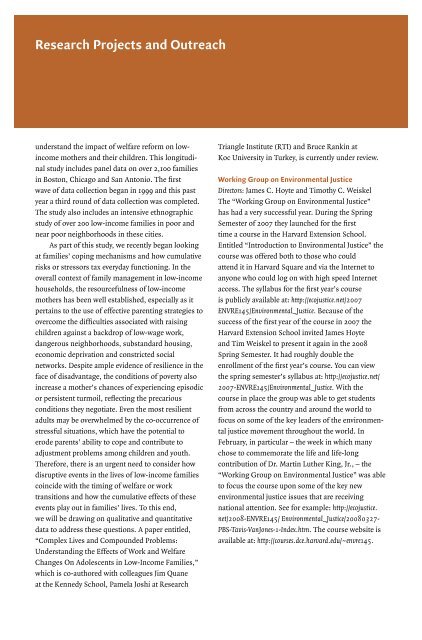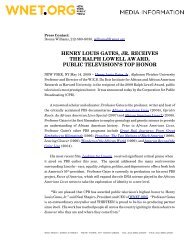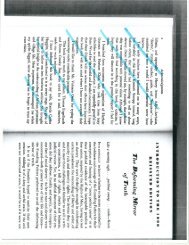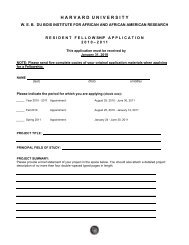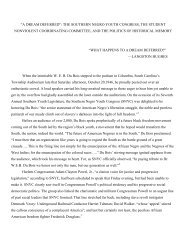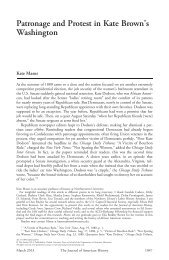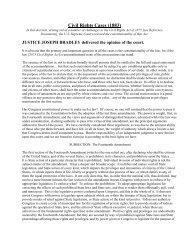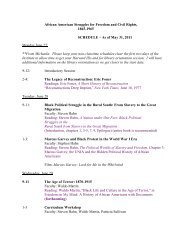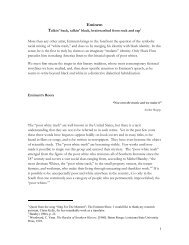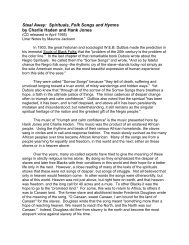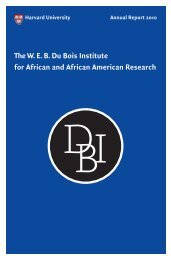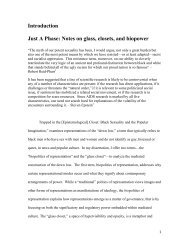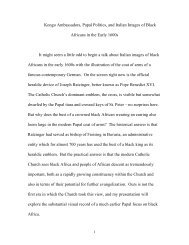AR-v.5 (1-27):Layout 1 - Hutchins Center - Harvard University
AR-v.5 (1-27):Layout 1 - Hutchins Center - Harvard University
AR-v.5 (1-27):Layout 1 - Hutchins Center - Harvard University
You also want an ePaper? Increase the reach of your titles
YUMPU automatically turns print PDFs into web optimized ePapers that Google loves.
Research Projects and Outreachunderstand the impact of welfare reform on lowincomemothers and their children. This longitudinalstudy includes panel data on over 2,100 familiesin Boston, Chicago and San Antonio. The firstwave of data collection began in 1999 and this pastyear a third round of data collection was completed.The study also includes an intensive ethnographicstudy of over 200 low-income families in poor andnear poor neighborhoods in these cities.As part of this study, we recently began lookingat families’ coping mechanisms and how cumulativerisks or stressors tax everyday functioning. In theoverall context of family management in low-incomehouseholds, the resourcefulness of low-incomemothers has been well established, especially as itpertains to the use of effective parenting strategies toovercome the difficulties associated with raisingchildren against a backdrop of low-wage work,dangerous neighborhoods, substandard housing,economic deprivation and constricted socialnetworks. Despite ample evidence of resilience in theface of disadvantage, the conditions of poverty alsoincrease a mother’s chances of experiencing episodicor persistent turmoil, reflecting the precariousconditions they negotiate. Even the most resilientadults may be overwhelmed by the co-occurrence ofstressful situations, which have the potential toerode parents’ ability to cope and contribute toadjustment problems among children and youth.Therefore, there is an urgent need to consider howdisruptive events in the lives of low-income familiescoincide with the timing of welfare or worktransitions and how the cumulative effects of theseevents play out in families’ lives. To this end,we will be drawing on qualitative and quantitativedata to address these questions. A paper entitled,“Complex Lives and Compounded Problems:Understanding the Effects of Work and WelfareChanges On Adolescents in Low-Income Families,”which is co-authored with colleagues Jim Quaneat the Kennedy School, Pamela Joshi at ResearchTriangle Institute (RTI) and Bruce Rankin atKoc <strong>University</strong> in Turkey, is currently under review.Working Group on Environmental JusticeDirectors: James C. Hoyte and Timothy C. WeiskelThe “Working Group on Environmental Justice”has had a very successful year. During the SpringSemester of 2007 they launched for the firsttime a course in the <strong>Harvard</strong> Extension School.Entitled “Introduction to Environmental Justice” thecourse was offered both to those who couldattend it in <strong>Harvard</strong> Square and via the Internet toanyone who could log on with high speed Internetaccess. The syllabus for the first year’s courseis publicly available at: http://ecojustice.net/2007ENVRE145/Environmental_Justice. Because of thesuccess of the first year of the course in 2007 the<strong>Harvard</strong> Extension School invited James Hoyteand Tim Weiskel to present it again in the 2008Spring Semester. It had roughly double theenrollment of the first year’s course. You can viewthe spring semester’s syllabus at: http://ecojustice.net/2007-ENVRE145/Environmental_Justice. With thecourse in place the group was able to get studentsfrom across the country and around the world tofocus on some of the key leaders of the environmentaljustice movement throughout the world. InFebruary, in particular – the week in which manychose to commemorate the life and life-longcontribution of Dr. Martin Luther King, Jr., – the“Working Group on Environmental Justice” was ableto focus the course upon some of the key newenvironmental justice issues that are receivingnational attention. See for example: http://ecojustice.net/2008-ENVRE145/ Environmental_Justice/200803<strong>27</strong>-PBS-Tavis-VanJones-1-Index.htm. The course website isavailable at: http://courses.dce.harvard.edu/~envre145.


